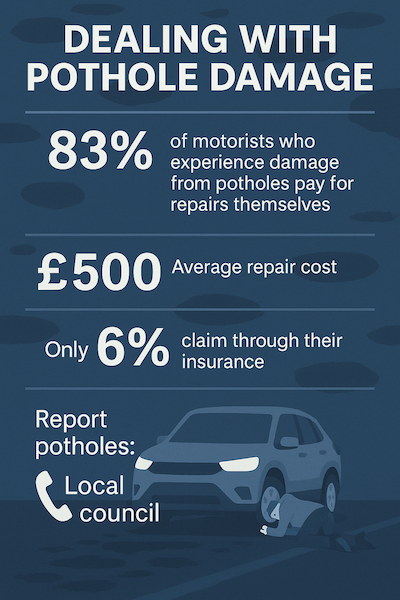Call Monday-Friday 9am - 6pm Closed Saturday & Sunday
How to Protect Yourself from Pothole Damage in 2025
Potholes have been a part of life on British roads for years, but in 2025, they are reaching a new level altogether.
Research published in May 2025 indicates that 83% of drivers who incur pothole damage are responsible for paying for repairs themselves, with the average cost per incident being approximately £500.
Despite these high costs, only 6% of motorists claim through their insurance, and an even smaller percentage claim from their local council.
As reported by BirminghamLive and RAC, concerns about road conditions have now overtaken worries about insurance and fuel costs for UK motorists.
Here we will look at the financial impact of pothole damage and insurance options open to minimise your risk.
The Pothole Crisis in Numbers
Pothole damage can cause a multitude of damage. You can see impact on your tyres, alloy wheels, bodywork and suspension parts. Much of this damage can render your car unsafe to drive on the road.
With millions of vehicles on local roads every day, wear and tear is inevitable, especially after harsh winters and underfunded road maintenance budgets. 
According to Simon Williams, the RAC's head of policy, drivers are now more concerned about local road conditions than any other motoring issue, including rising insurance premiums.
Pothole reports have increased by 40% year-on-year across England, indicating a decline in road surface quality.
The Department for Transport has acknowledged the issue and will support local councils to fix 1 million extra potholes a year. However, for motorists already damaged, these long-term promises offer little immediate help.
Why So Few Claims?
Despite the widespread damage and financial burden, many drivers don't claim. Some of the reasons are:
- Lack of awareness that pothole damage can be claimed on comprehensive insurance policies.
- Your motor excess must be exceeded to make a claim. With average claims around £500, no claim can be paid if your excess is higher than the cost of the claim.
- Concerns about premium increases after a claim.
- Frustration with the council claims process, which often results in rejection.
This lack of awareness and accessibility has meant most drivers pay themselves, a trend that experts say is unsustainable.
How to Protect Yourself
For drivers who want to protect themselves from the rising costs of pothole damage, here are a few ways to do so:
1. Motor Excess Insurance: One of the simplest ways to mitigate the cost of pothole claims is to take out Motor Excess Insurance. This covers the policyholder's excess in the event of a successful claim, so if you do have to claim for pothole damage, the excess doesn't come out of your pocket.
2. Cosmetic Repair Insurance
Some policies, such as SMARTCare Cosmetic Insurance, can also cover alloy wheel damage or minor bodywork scrapes that often result from potholes or poor road conditions.
3. Tyre Insurance
Specialised tyre insurance can cover punctures and blowouts caused by road defects, a common outcome when hitting a deep pothole.
Claiming from Councils: Know Your Rights
Although it's a bureaucratic process, drivers are legally entitled to claim from local authorities if damage occurs due to poorly maintained roads. The keys to a successful claim are:
- Collecting photographic evidence of the pothole.
- Obtaining a repair invoice or quote.
- Securing a crime reference number if the damage was extensive.
- Showing the council failed to maintain the road despite previous reports.
You can start this process by reporting the pothole via your local council's website. A guide on the government website can be found here.
It's also worth logging it on public databases such as FillThatHole.org.uk, which councils reference when determining road repair priorities.
Insurance Claims for Pothole Damage
If you have a comprehensive car insurance policy, you're likely covered for pothole damage, mainly if it affects key components like wheels, suspension or steering. But be aware:
- Your policy excess will apply (unless you have Motor Excess Insurance).
- A claim could affect your no-claims bonus.
Greg Wilson, CEO of Quotezone, says if your claim to the council is rejected, your insurance provider becomes the next port of call. It's worth weighing the cost of repairs against the long-term impact on your premium before making a claim.
Prevention Is Better Than the CureYou can't always avoid potholes, but there are steps you can take to reduce the risk of damage:
- Avoid driving too close to the kerb, where potholes are more common.
- Be aware of road conditions, especially after rain, as it can conceal potholes.
- Slow down in areas known for poor road maintenance.
- Keep tyres inflated to manufacturer guidelines to reduce the risk of rim or tyre damage.
A Growing Problem
The pothole crisis is nothing new. Many articles have been written in the last few years, including one on our sister website, Total Loss GAP, in March 2022, which highlights the issue: "The UK Pothole Issue: Have We Reached Crisis Point?"
The question is are we getting anywhere near solving the problem?
Conclusion
As potholes continue to plague UK roads in 2025, it's more important than ever for drivers to know their rights and options.
While the Government may fix some potholes, the race is always on to catch up with the new ones being created.
Whilst more potholes appear than are being fixed, the financial impact on individual drivers is still high.
By utilising smart insurance products and understanding how to claim compensation, drivers can safeguard themselves and their finances.
Don't let a pothole drain your wallet. Know your cover, know your rights, and make sure you are protected.
Written by Mark Griffiths, published 3/6/25


